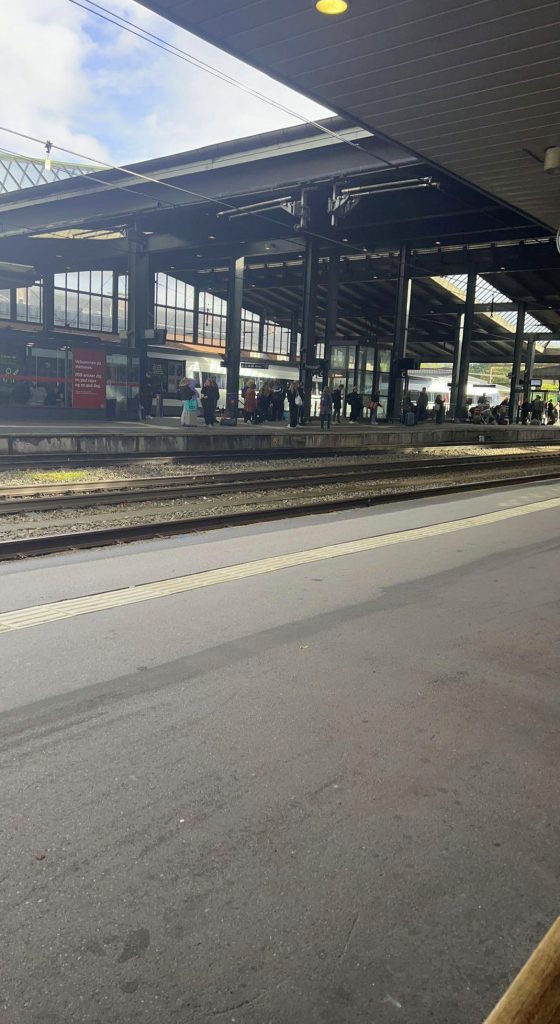Masks have become an essential part of any traveling student these days.
It has been two years since the pandemic sent shockwaves through the world. Ever since, we have dutifully worn masks and overused hand sanitizer to avoid spreading the virus. Today, most places no longer require negative tests or mandatory masks. However, public transportation in Schleswig-Holstein, and most of Germany, still requires people to wear masks in trains and buses. The topic of masks has divided the political agenda, with many voting for abolishment, and many against.
Yet, there does seem to be an end in sight.
Current situation
The mask rule has been around ever since the pandemic took form. While the mask is not enough to keep the virus at bay, it has definitely aided in preventing further spreading. As it currently stands, in late 2022, the mask is only a requirement on public transportation. The topic has sparked a divided debate amongst political parties, especially Schleswig-Holstein has been pushing to change the obligation of masks. Some parties are in favor of masks being a recommendation instead of a requirement.
“We are advocating for a mask recommendation instead of a mask requirement.”
Andrew Ullmann, Health Policy Spokesman for FDP (Source: Die Welt)
Others claim the relaxation of these rules will only bring more infected, especially during the winter season.
“There are no new, medically evident reasons why there should now be a deviation from the separation and isolation obligations previously provided by law, or mask obligation, in local transport”
Janosch Dahmen, Health Policy Spokesman for the Greens (Source: Die Welt)
According to expert sources, the mask will no longer be mandatory but rather a strong recommendation towards the end of this year. This heavily depends on the numbers, however.
Students, masks, and public transport
As a student, using public transportation daily is common, especially with students from Fachhochschule Kiel. Many students live on the other side of the fjord, in the city center, whilst the Fachhochschule is located on the opposing side. Those who use the ferry do not have to worry about masks, however, those who use buses have made it a habit to bring a mask with them whenever they step outside.

“I think it makes sense with public transport. There are so many people in the buses all the time, and we often stand really close with each other. With overfilled buses and random people breathing you down your neck, I feel safer with my mask on.”
Annika Baumer, Student
“Its like the masks are a currency, or a passport. If I forget to bring one, then I have no way to reach the school. I always carry an extra mask in my bag, but sometimes I forget about it. It gets really annoying sometimes, especially because before and after entering the bus, I am surrounded by the same people that I wore a mask with. We all talk and walk past each other without masks before or after the bus, so I don’t see a point in continuing to wear it”
Sophie Altmann, Student

Many feel like the masks no longer serve a purpose. Outside of transportation, the mask is not a requirement, and many people don’t wear them. Inside of stores or the universities, or anywhere with more than 10 people, people simply do not use them. So how come it is only on public transportation? Once again, the opinion on masks is divided. Some feel safer, others feel it’s useless.
Across borders
The usage of masks on public transport is not the same for many European countries. The border country, Denmark, has no mask regulations at all. This becomes somewhat of an issue when changing trains between the two countries. One country does not require masks, yet the other one does. In often cases, you end up wearing masks around the same people you have been sitting next to, maskless, for hours.

“As a student travelling often by trains back and forth between Germany and Denmark, I too have found it to be a little odd. Up until Flensburg, the mask is mandatory. However, as soon as I step into the train that will take me to Denmark, the mask is no longer required. Ironically enough, I am surrounded by the same people I travelled with in the German train; now without masks. In situations such as these, the idea of the mask being used to prevent spreading loses its purpose. As there are no mandatory mask requirements in Denmark, the transit between the two countries and rules get a little muddy. The same can be said about the other way. All the way to Flensburg, I do not wear a mask. As soon as we pass the border, despite having sat in the train for 3 hours with the same people, we are told to put masks on.”
Caroline Christensen – Erasmus Student from Denmark
It’s hard not to question why masks are still required in Schleswig-Holstein, especially when compared to neighboring countries. Nevertheless, taking the precautionary means to avoid spreading is always the best way to go.
The verdict?
It seems that masks on public transport are here to stay, at least until the winter season is over. Towards the end of this year, and the beginning of the next, it seems that masks will no longer be mandatory. This, however, strongly depends on how many will be infected and whether or not masks need to be kept to lower the numbers again. Nevertheless, there is a small hope for an end in sight.
How do you feel about the masks on public transport? Let us know what you think!
![FHews – [ fju:s]](http://fhews.de/wp-content/uploads/2015/05/fhews_logo2_3B8ACC.jpg)









No Comment